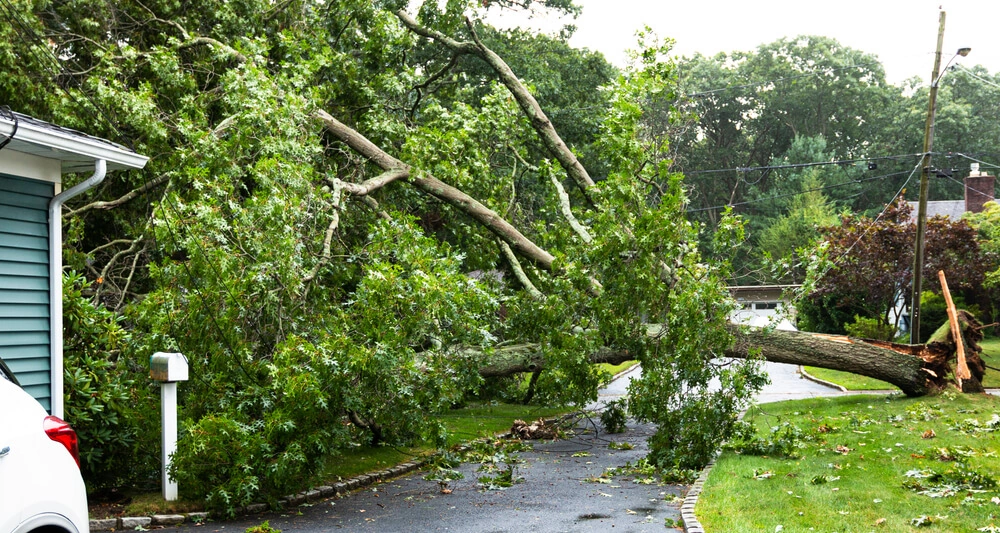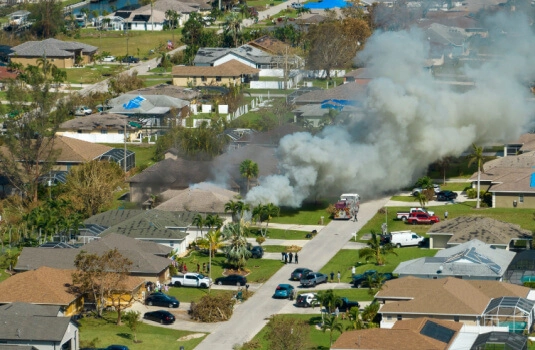
In most cases, the answer is yes, but let’s dive in a little and examine the answer.
Your home is your castle and may be the largest investment you’ll ever make. So, of course, you have a homeowners insurance policy. For one thing, you couldn’t get a home loan without such coverage — and even if you own your home outright, why wouldn’t you protect your biggest investment?
You have that policy stored safely away … somewhere. When was the last time (if ever) that you actually read it? Do you know what it does and doesn’t cover? For example, does homeowners insurance cover damage you cause to your neighbor’s property?
If you had to take a pop quiz, you could probably guess the main points of coverage: Fire! Smoke! Burst water pipes! Burglary! Vandalism! Tornado damage!
That’s a good start. But what if a mishap at your place causes injury to another person or damage to a neighbor’s property? Does homeowners insurance cover fire damage to a neighbor’s property? For instance, if a fire begins in your home and causes smoke or flame damage to a nearby home, are you covered?
Yes, in all probability, you are.
Why This Financial Protection Might Be Critical
If you live in a farmhouse a mile from your closest neighbor, this lesser-known homeowners insurance benefit for Georgia residents probably isn’t too important. But it’s different if you own a condo unit in a condominium complex. Or if your place is a townhouse, cluster home, or other property attached to or very close to neighboring structures.
Even if your neighbors aren’t quite that close, a falling tree or tree limb could affect others in big ways.
That’s why most homeowners insurance policies include liability protection.
What Is Liability in Homeowners Insurance?
Liability helps protect your finances if damage occurs to third parties through your fault or others in your household.
For example, your young child starts a fire while playing with matches. The fire is extinguished but it causes smoke damage to another condo unit. Or a dead tree (that you should have removed a while ago) falls and damages a neighbor’s garage.
These are examples of when your liability can kick in to help cover costs.

What if You’re Not at Fault?
Let’s say that a large limb of your healthy tree falls on your neighbor’s garage due to a lightning strike. Are you at fault?
Not when it’s an act of nature. The damage could not have been foreseen or prevented. What your homeowners insurance doesn’t cover in Georgia falls under these guidelines.
What Should You Do if a Neighbor Accuses You of Causing Damage to Their Home?
Contact your homeowners insurance agent immediately. Also, take photos of the damage if you can do so. Show the evidence to your agent and explain the circumstances. Your agent will take it from there. If you’re the victim — for instance, a neighboring townhouse fire spread to your residence — your insurer will likely pay the covered damages as soon as possible. Then your insurer might sue the other party or its insurance company for reimbursement if it’s proven it was that party at fault.
The point is, if your property is damaged you won’t have to wait months or years for the case to wind its way through the legal system while insurance companies fight over who is responsible for the settlement.
Review Your Deductible and Coverage Limits
Your deductible is the out-of-pocket cost you’ll pay before your insurer handles the rest of the covered settlement. If you carry a $2,000 deductible, that’s the amount you’ll have to pay before your insurer pays the remaining $18,000 of $20,000 in fire damages.
The coverage limit is the maximum amount for which your property is insured.
By keeping a high deductible and low coverage limits, you’ll reduce the cost of your homeowners insurance. The downside, of course, is that you’ll pay more out-of-pocket if you have an expensive claim.
It’s a trade-off. Your insurance agent can offer you other ways to save money on your home insurance coverage and help you determine if the balance between your deductible, coverage limits, and the insurance rates you pay is the right fit for your budget.